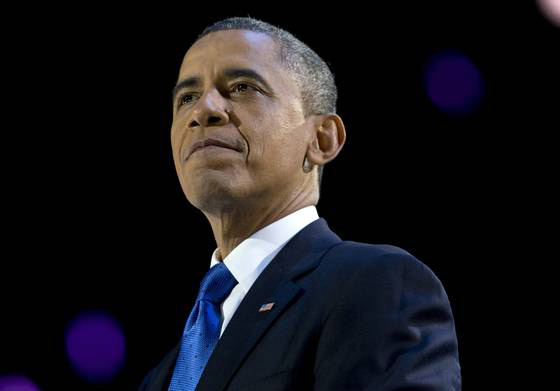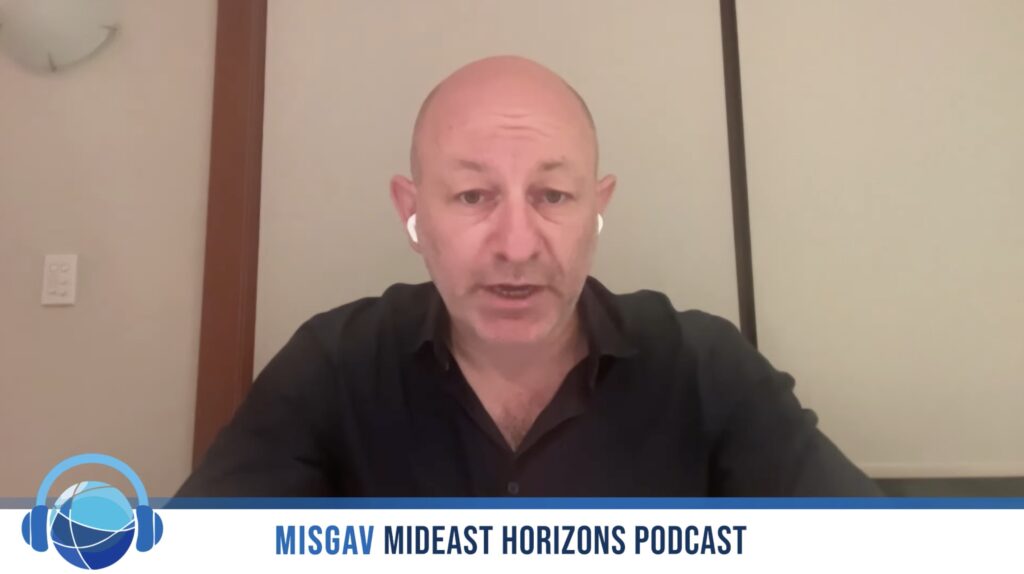UPDATES
The Middle East in President Obama’s Second Term
November 9, 2012

Update from AIJAC
November 9, 2012
Number 11/12 #02
With the US election finally decided on Tuesday, and President Barack Obama returned to office reasonably comfortably, this Update looks at his Middle East challenges over the next four years.
An excellent starting place is the Washington Institute for Near East Policy forum on the subject, held yesterday, which is available for online viewing here (no transcript yet available).
First up in the Update proper is former Middle East mediator Aaron David Miller, who says that the Middle East looks to be shaping up to be a key to President Obama’s legacy, and offers some advice based on his long involvement in Middle East policy-making in both Republican and Democrat administrations. The theme of his advice to President Obama is humility, modest goals, and avoiding over-reaching in a variety of policy areas. This applies especially to the Israeli-Palestinian arena – where Miller advises “think interim agreements and managing the conflict” – but he also has some advice about how to maximise the admittedly low chances of reaching a nuclear deal with the Iranians, and on dealing with the Syrian situation. For this prognostication and advice from a very experienced source, CLICK HERE. Another general exploration of Obama’s Mideast challenges comes in the form of a brief statement from Washington Institute head Rob Satloff.
The next entry comes from another Washington insider, former senior Bush Administration official Elliot Abrams, who agrees that the Middle East will inevitably continue to have to be a key focus for the Obama Administration, but offers some differing views on both what is likely to happen, and what should be done about it. Abrams stresses his concerns that the Administration could reach an Iran deal that in fact does little to curb Iran’s nuclear ambitions. Similarly, in contrast to Miller, who argues we’ll see continuity and stalemate in Syria, Abrams predicts the Administration will have no other choice than to be more interventionist in Syria. He’s also got some interesting comments on the US approach to Israeli-Palestinian issues and the “Arab spring” regional changes, and to read it all, CLICK HERE. A similar sceptical view of Obama’s Middle East prospects comes from author Lee Smith in the form of a piece speculating what things might be like in the region in 2016.
Finally, Washington Institute expert David Makovsky focuses explicitly on American-Israel relations over the next four years, and especially the less-than-warm relationship between Obama and Israeli PM Binyamin Netanyahu. Makovsky stresses that while Netanyahu probably would have preferred a different outcome to the US election, he was – contrary to claims often heard – careful never to endorse Romney and there is little likelihood that there will be any ongoing grudge in their relationship. Makovksy notes that Obama is going to urgently need to work with Netanyahu on both Iran and the Palestinian issue – an area he urges cannot be ignored despite the current stalemate – and has limited political capital to do so. Assuming Netanyahu wins his own election, he argues, both leaders will have little choice but to “to manage their differences and find a way to work together better than they have in the past.” For this important analysis in full, CLICK HERE. Some similar views on the Obama-Bibi relationship comes from Israeli journalists
Readers may also be interested in:
- Israeli journalist and blogger Shmuel Rosner looks at the Jewish vote in the US poll and its affect on US-Israel relations.
- Israeli security columnist Ron Ben Yishai argues the Obama election win is good for Israel, while fellow Israeli columnist David Weinberg argues the opposite case.
- Jonathan Tobin discounts a claim that Obama might seek to impose a peace deal on Israel. Plus, veteran Israeli columnist Evelyn Gordon notes that, if anyone was hoping for a major change of Israeli policy on peace with the Palestinians in the upcoming election, Netanyahu’s main rival, Labor leader Shelly Yacimovich actually has very similar views on these issues – if not on others.
- Walter Russell Mead has some more on Obama’s Syria dilemmas in coming weeks, as does David Schenker.
- Israeli company unveils a bicycle made out of cardboard.
- A fascinating, if long, analysis of the current state of the Israeli-Palestinian peace process, and the best way to move it forward from noted political scientist Dr. Max Singer.
- Some examples from the many stories and comments now appearing at AIJAC’s daily “Fresh AIR” blog:
- Daniel Meyerowitz-Katz offers some detailed analysis of a leaked draft resolution that the Palestinians want to introduce to give themselves “non-member state” status at the United Nations.
- Ahron Shapiro looks at the Palestinian reaction to some apparently conciliatory statements on the claimed Palestinian “right of return” in an interview by PA President Mahmoud Abbas last week.
- Sharyn Mittelman on the lack of interest in the Palestinians dying in the Syrian civil war.
- Finally, for those with an interest in the global role of India as a rising international power, noted Indian author and Journalist Sadanand Dhume’s speech at the Sydney Institute on the subject earlier this week will be broadcast on Australia’s Public Affairs Channel, A-PAC, (Channel 648 on Foxtel and their website http://www.a-pac.tv/ ) tomorrow, Saturday 10 November, at 1:20pm and 7:50pm and on Monday at 11:20am.
How the Middle East Could Make Or Break Obama’s Legacy
Congratulations, Mr. President. You’ve got four more years of dealing with the world’s most dysfunctional region.
BY AARON DAVID MILLER
Foreign Policy, November 7, 2012
Congratulations, Barack Obama. You now join a small club of 16 two-term presidents. (Of those, only 13 actually served out their second four-year term — William McKinley, Abraham Lincoln and Richard Nixon weren’t so lucky.)
An eight-year run does count for something. There are no great one-termers. All consequential presidents require a bond with the public that the validation of a second term provides. Consider it a necessary but not sufficient condition for presidential greatness.
Governing this republic effectively is hard and sometimes, I think, borders on the impossible. To a certain extent, the founders willfully contributed to the problem by designing a system that the late constitutional scholar Edwin Corwin brilliantly described as an open invitation to struggle. They did so to make the accretion of too much power by an individual or branch of government very hard.
But they still reserved for the presidency the capacity — depending on the president and his circumstances — to lead energetically, in a way 535 elected legislators or 9 Supreme Court jurists cannot. The presidency is the only national office all Americans can vote for — it stands for something special, and remains to this day, regardless of its flaws and tendency to disappoint, the repository of our hopes and aspirations.
John F. Kennedy once said that nobody should judge presidents — not even poor James Buchanan — because it’s impossible to know what it’s really like to be in the White House.
Fair enough. At the same time, we elected you — myself included. And, not to put too fine a point on it, you work for us.
And so, having worked for several of your predecessors on Middle East policy — and having watched Republican and Democratic administrations succeed and fail in foreign policy — I don’t have the slightest reservation in offering up a number of suggestions for your second term.
1. Don’t look for transformation this time around.
I get the fact that in your first term you saw yourself as a transformative figure — a leader with a mandate to save the nation through bold policies at home and abroad.
And maybe you thought the country wanted a savior. I know that Abraham Lincoln was very much on your mind. With the possible exception of George W. Bush, you owe your presidency to him more than any other man.
We got the point. You recreated part of Lincoln’s train journey to Washington, were sworn in on his Bible, and all but reenacted his post-inaugural lunch — right down to the sour cherry chutney served on Mary Todd Lincoln’s china.
With all due respect, Mr. President, try to be a tad more humble and less narcissistic in your second term. I knew Abe Lincoln, and you’re no Abe Lincoln. I know you already think you’re entitled to be in the presidential hall of fame, but forget transforming the country at home. Americans don’t want a polarizing transformer; they want a president who can fix what’s broken — this time with the support of Republicans so that change can be legitimate, authoritative, and successful.
Abroad, you also thought you would transform the world. You seemed to believe that, somehow, your own persona and the imperfections of your predecessor could combine to solve historic conflicts and convert adversaries into friends. But the world wasn’t and isn’t going to be transformed by you or anyone else. Look around at the 192 other nations represented in the United Nations. Do you see any transformative figures there, or international conflicts just waiting to be solved?
If the world is amenable to anything these days, it’s transaction. Sports analogies are usually horrible, but in this case I think one works: Forget home runs; try small ball. Moderate progress, after all, can buy time to deal with the bigger issues like Iran and the Israeli-Palestinian conflict (more on that later).
2. Legacy cuts both ways: the hero or the goat
Having been elected to a second term, the only thing you’re running against now is the reputations and accomplishments of your predecessors. Health care — it’s too soon to know for sure — may be your domestic legacy. But the temptation to secure a foreign-policy spectacular will be great, too.
I saw the draw of legacy play out in a negative way during the final year of the Clinton administration. As Clinton saw his last days in the White House tick away, he grasped on to the idea of hosting an ill-timed, ill-prepared, and poorly thought-through summit with Israeli Prime Minister Ehud Barak and Palestinian leader Yasir Arafat at Camp David in July 2000.The rush to the summit led to a collapse of the peace process from which Israeli-Palestinian negotiations have yet to recover. Arafat received much of the blame for Camp David’s failure, much of it well-deserved but counter-productive nonetheless, leading to another spasm of violence.
As the sand passes through the hourglass of your second term, that’s something to keep in mind. Yes, a dramatic success on a tough issue can add to the luster of your presidency. But failure also carries consequences that go well beyond your presidency and can have serious implications for your successor.
3. Empower your secretary of state
I would have thought, given the huge domestic crisis you faced in 2008, that you would have been only too happy to delegate significant responsibility to your diplomat-in-chief. And why not? Hillary Clinton is talented and knowledgeable. And while certainly not a great secretary of state in the mold of Henry Kissinger or James Baker, she has done an immense amount to improve America’s image by pursuing an agenda of global humanism — emphasizing the role of women, the environment, technology, and social media.
But when it came to the big issues such as Iran, Afghanistan, Iran and the Israeli-Palestinian conflict, you withheld far more than you gave. All power on these issues flowed to and from the White House. Clinton owned not a one of them.
No matter whom you choose as your next secretary of state, you ought to be more generous in delegating authority over some of these big issues.
Yes, this may conflict with your desire to forge your own legacy. But presidents can’t be everywhere and do everything. Smart and empowered secretaries of state can set up all kinds of opportunities through the tireless and tedious diplomacy that you may not have the time to join. Baker worked for nine months to set up the Madrid peace conference for Bush 41. Madeleine Albright labored for a year and a half to set up the Wye River Summit and prevented a great deal of Israeli-Palestinian violence in the process. Give your secretary of state a few big issues — he or she can actually make you look good, and serve American national interests too.
4. Come clean on Benghazi
You have a real credibility problem on this one from almost every conceivable angle. You’ve prided yourself on competence in foreign policy, and yet the fatal attack on the diplomatic mission in eastern Libya raises serious questions about your administration’s judgment and performance.
Over the past two months, the questions have piled up higher and higher: Why weren’t adequate preparations taken months before the attack to deal with what was clearly a higher threat level to Western and U.S. interests in Libya? What was the CIA’s role in responding to the crisis, and the Pentagon’s too? And what about the confused and misleading messages that came from your administration as you responded to the crisis?
Neither a congressional nor a State Department investigation will be credible enough to answer these questions. Some independent panel should be created — one with the mandate to go after the White House, too — to determine what transpired. In a turbulent Middle East, the threats to America’s diplomats will continue. We need to figure out a better way to minimize the risks.
5. The Middle East is a choice between root canals or migraines. Pick your poison.
No region of the world is going to be more dangerous for the United States than the Middle East. Challenges abound — but at the moment there don’t appear to be a great many opportunities. Disengagement, sadly, is not an option.
Again, think transaction, not transformation. On Iran, explore the hell out of diplomacy before you seriously consider military action — let alone war. Getting out of these conflicts is always more difficult than it seems, and the risk-to-reward ratio on Iran is inherently skewed toward the risk end. Once a nation acquires the knowledge and capacity to construct a nuclear weapon, it can’t just be bombed out of its collective consciousness. Military actions will at best delay, not prevent, Iran from acquiring nuclear weapons.
Unless you can change the mullahcracy in Tehran, your best bet would be an outcome that would keep Iran years away from actually making a nuclear weapon. Given the depth of animosity and mistrust between the United States and Iran over the last half-century, the odds of a grand bargain are pretty low.
But here’s how to give it your best shot: Start with an interim arrangement that deals with the issue of enrichment, and forestalls Iran from acquiring enough highly enriched uranium to construct a nuke. To get such a deal, by the way, you can’t just come to the party with sticks. Carrots will be required too — not only some sanctions relief on the enrichment question, but developing Iran’s enrichment capacity on the civilian side. None of this may work — but a good-faith, sustained effort is critical to your credibility and to any follow-on military attack.
On Israeli-Palestinian peace, think interim agreements and managing the conflict. Barring some profound change in the politics of Israel or Palestine, no conflict-ending solution that addresses borders, Jerusalem, refugees and security is likely.
Also, prepare to deal with Prime Minister Benjamin Netanyahu for some time to come. If you’re looking to get even with him for stiffing you on settlements, sit quietly until the urge passes. Israeli elections in January will likely return Bibi to power, and if his coalition expands it will be for the purpose of stability and maybe war with Iran — not for bold moves toward the Palestinians.
Let’s face it: You don’t have much credibility with Netanyahu. If you want any progress, you’re going to have to figure out a way to create a relationship with him. In any event, think small for now. Do what you can to keep the Egyptian-Israeli peace treaty afloat. Push international donors to keep the Palestinian Authority in the black. Press hard on keeping Israeli-Palestinian security cooperation up and running. Push the Israelis to end restrictions on movement and economy opportunities for Palestinians. And, if there’s a way to encourage quiet discussion on the least contentious final-status issues like territory and security, try that too.
If you truly can’t help yourself and need to lay out a U.S. plan on all of the big issues, go ahead. Chances are they’ll still be out there when your successor takes the inaugural oath. But don’t delude yourself with visions of being the man to solve this thing once and for all.
On Syria, don’t be lulled into believing that some notional post-election flexibility is going to expand your options there. As long as the rebels are so inchoate, the regime so militarily powerful, and the Russians so supportive of President Bashar al-Assad, the chances for dramatic change are pretty low.
That doesn’t mean you should be idle on the Syrian front. Do what you can to ease the humanitarian and refugee crisis. Support Jordan, continue to work with the Turks, and support efforts to encourage a credible Syrian opposition. But be wary of a more proactive policy on the military side, particularly when it comes to providing sophisticated weaponry to a divided rebel movement whose interests may not necessarily be yours and which is acquiring its own record of war crimes.
6. Fix America’s house even as you persist in trying to fix others.
Here’s the bad news: Your credibility will begin to diminish the first day after your inauguration, and your status as a lame duck will grow ever closer as 2016 nears.
It’s not that you can’t chew gum and walk at the same time. The United States has to be involved in the rest of the world even while its domestic house is in a state of disarray. The major priority, though, must be on fixing our broken house and addressing the Five Deadly D’s that sap American strength: debt, deficit, dysfunctional politics, decaying infrastructure, and dependence on hydrocarbons. If you bet on risky adventures abroad and lose, your credibility and political stock will fall when, in fact, it’s badly needed to deal with pressing domestic matters, particularly the economy.
Governing is about choosing. The best thing you can do both for America and its position in the world is to address the sources of domestic weakness. If you succeed on that front, you will be strengthening the foundation on which our foreign policy rests. And in the process, who knows? You might actually become what you aspire to be — a truly consequential American president.
Aaron David Miller is a distinguished scholar at the Woodrow Wilson International Center for Scholars. His forthcoming book is titled Can America Have Another Great President?
Back to Top
————————————————————————
Obama and the Middle East
The greatest is Iran, which keeps on installing centrifuges and pilling up enriched uranium while we chat, negotiate, chat about negotiating, and vote. The Iranians can easily play out the clock — unless we stop them. President Obama has repeatedly said he would do so, but that of course was during the campaign. Now what? Rumors about secret talks continue to circulate, and one Israeli newspaper has published the story that our — the United States — negotiator was Valerie Jarrett! What must even John Kerry and Hillary Clinton really think of that? The White House has yet to issue a denial of that story, as far as I am aware.
The easiest escape route for Obama is a deal, any deal, with Iran. He can then claim to have solved the nuclear problem or at least delayed it — but can also expect that skeptical Republicans will challenge terms that appear to allow the Iranian program to continue. Republicans, including Governor Romney, stuck to the terms of the U.N. Security Council resolutions: zero enrichment, export of all enriched uranium. An Obama deal that would allow enrichment would allow Iran to master the process fully, keep the Fordow and Natanz enrichment sites open, and introduce more efficient centrifuges. That’s a bad deal Republicans should rally in opposition to it. It is quite possible that Ayatollah Khamenei will not agree to any deal with the Great Satan, leaving Obama with an even greater problem: let Iran move forward toward the bomb or actually use those “options on the table” that include military force. But when Obama hears from the Pentagon that any American strike must take weeks and be a small war, he may find that he wants to think again about the utility of an Israeli strike. Again, the most likely outcome is a bad deal — the Ayatollah willing. And the beginning of the bad deal would be bilateral negotiations between the U.S. and Iran. Watch for it.
On Syria, Obama will have to abandon his politically derived allergy to American action. Nearly 40,000 are dead and the war must be ended — with Assad gone. I believe the current efforts to remake the opposition are a prelude to more American action on the ground, likely via CIA. Look for secret strikes, drone strikes, arming the rebels, and the like — the kind of indirect, quick, deniable (unless successful) military action Obama likes best.
Two more issues that are not crises: the “Arab Spring” and the rise of Islamic governments, and the Israeli-Palestinian issue. On the former, look for more accommodationism. Obama will not want to confront the new regimes on issues like religious freedom, freedom of speech and press, and the role of Islam in society. On the latter, look for a few initiatives: I believe there will be some form of negotiations next year after the Israeli elections. Those January 22 elections deliver a useful cooling off period now, until a new coalition is formed around March 1. Obama will then seek to get them to the table — where nothing will be agreed. A second-term Obama policy may not push as hard, and as publicly, for a deal as his first-term policy tried (and failed dismally), but it will still fail to focus on the slow, steady, unromantic work of building institutions in the West Bank that could someday form the basis for a state.
Finally, Obama will confront another problem: lack of skilled manpower. Several of the top experts in the State Department have left or will probably leave soon: Jeffrey Feltman, Jim Jeffrey, and Bill Burns are examples. Who will be named assistant secretary of state for the Near East? Will old Democratic party hands like Martin Indyk and Dennis Ross be brought back again?
In the coming weeks look for any news stories suggesting more arms are moving to Syrian rebels, and stories about U.S.-Iran bilateral negotiations, open or secret.
Elliott Abrams is senior fellow for Middle Eastern Studies at the Council on Foreign Relations (CFR) in Washington, D.C. He served as deputy assistant to the president and deputy national security adviser in the administration of President George W. Bush, where he supervised U.S. policy in the Middle East for the White House.
Back to Top
————————————————————————
Relationship Advice
By David Makovsky
Foreign Policy, November 8, 2012
In the wake of U.S. President Barack Obama’s reelection victory, some have suggested that he will pursue a feud against Israeli Prime Minister Benjamin Netanyahu, given the two leaders’ disagreements over how to pursue peace with the Palestinians and deal with the Iranian nuclear threat.
There is no denying that the relationship between the two leaders has been rocky. Yes, Obama believed Netanyahu had wrongly lectured him about borders in front of the media in the Oval Office in May 2011. Netanyahu has his own grievances: He was upset that he could not get a September meeting with the president to discuss Iran, for instance. As Israeli Interior Minister Eli Yishai put it the day after the U.S. election, “It seems like it is not such a good morning for Prime Minister Benjamin Netanyahu.”
While it is safe to assume Netanyahu personally preferred Mitt Romney, he in fact did not endorse Obama’s Republican challenger — despite every Israeli reporter’s efforts to entice him into doing so. As one Netanyahu aide put it privately, when it comes to the U.S. election, “our room to maneuver on this issue has the width of dental floss.”
But at the end of the day, a settling of scores between Obama and Netanyahu is unlikely. It is counterproductive for the two leaders to focus their energies on the past when they are confronted by an array of challenges that will require them to work together.
Obama’s cerebral style toward foreign leaders made Israelis skeptical of him, in part because it was a departure from the bear-hug style of President Bill Clinton. But it is also one reason the United States and Israel will now avoid a public feud. As Dan Shapiro, Obama’s former top White House aide and current U.S. ambassador to Israel, told a panel in Tel Aviv on Nov. 7, “The president is a strategic thinker; his policies are not governed by emotion.” He termed talks of Obama taking revenge against Netanyahu “ridiculous.”
Too much is at stake for both countries to let old grudges dictate policy. It is no secret that the Obama administration views a new diplomatic initiative toward Tehran as integral to its sanctions policy. The potent international sanctions currently in place, combined with diplomacy, are the world’s one hope of solving the Iran nuclear crisis peacefully. Nobody can guarantee that Iran will back off from its program, but a U.S.-led offer is still inevitable to test that proposition.
And Israel knows this. Contrary to perception, Netanyahu would also like to see a peaceful end to the crisis — there is no Gen. Curtis LeMay figure in the Israeli government out to firebomb Iran. Whether it is in the format of bilateral U.S.-Iran talks or the P5+1 (the five permanent members of the U.N. Security Council plus Germany), the United States will want Israel on board with U.S. diplomatic efforts to avoid the prospect of an Israeli strike. This does not give Netanyahu any kind of veto over the U.S. offer to Iran, but it is hard to imagine that the United States would not welcome Israel’s thoughts to ensure that the two countries do not act at cross-purposes.
This process will test the personal relationship between Obama and Netanyahu like no other foreign-policy issue — and it will leave no time for petty score settling. Israel and the United States are going to need to be in closer consultation than ever about Obama’s highest foreign-policy priority: namely, ensuring that Iran does not go nuclear and that a nuclear arms race does not break out in the region. Failure would mean the end of Obama’s plans to promote nuclear nonproliferation, and it would also cripple U.S. credibility after three administrations — Democrat and Republican alike — have vowed that Iran will not get the bomb.
Moreover, those who are playing up the possibility of an Obama-Netanyahu feud believe that the laws of political gravity are suspended for a second-term president. In fact, while reelection can revitalize a president’s mandate, political capital remains a finite commodity — even for a second-term U.S. president. Just ask President George W. Bush, who saw his clout diminished in his second term by Hurricane Katrina, a failed attempt to privatize Social Security, and a debilitating war in Iraq. Bush allocated all his efforts to the 2007 Iraq surge, and administration officials at the time said not much political capital was left over for anything else. As it is, Obama is facing a divided Congress that he will need to win over for a grand budget deal in 2013, which will be central to resolving the country’s economic crisis.
This is not an argument for Obama to avoid the Palestinian issue and focus solely on Iran. To the contrary, advancing a two-state solution is essential if Israel is to remain a Jewish, democratic state and not a de facto binational state, and for the Palestinian national movement to have a real future. Moreover, whatever the arguments between the parties at the U.N. General Assembly this month, when the Palestinian Authority is expected to pursue its bid for statehood, it is important that the Palestinian Authority does not go bankrupt. The collapse of the one existing institution that could potentially serve as the core of a new Palestinian state would not benefit the United States, Israel, or the Palestinians.
Once again, Obama is going to need Netanyahu’s help to advance these goals — and the president should assume that the Israeli prime minister will remain on the political scene for some time yet. Polls show Netanyahu is likely to win the Israeli election on Jan. 22, given his merger with the right-wing Yisrael Beiteinu party and his natural alliance with religious parties. Former Prime Minister Ehud Olmert may enter the race looking to unite the center, and he may hint in his campaign about his proven willingness to make tough decisions — notably, a still officially secret strike against a Syrian nuclear reactor in 2007 and his willingness to make difficult concessions on peace to the Palestinians. The odds favor Netanyahu at this time, however.
An Obama swipe at Netanyahu would not necessarily hurt the current prime minister, but could boomerang against the president. Obama does not have Clinton’s endless reservoir of support among the Israeli public, regardless of the important strides in bilateral security between the two countries over the last four years. One poll showed a majority of Israelis favoring Romney.
At the same time, Netanyahu can learn from the past as well. He is shrewd enough to realize that a broad-based unity government is essential if he wants to avoid the disproportionate influence of hard-line elements within his coalition, which could lead him to focus excessively on settlements. With the challenge of Iran and the Palestinian issue, a broad-based government will minimize the prospects of friction with Washington.
Of course, the Palestinians must also do their part for negotiations to be a success. They need to return to the table after leaving in September 2010 over demands for an extended settlement freeze in the West Bank. Obama has every right to insist that both Palestinian President Mahmoud Abbas and Netanyahu provide a sense to the United States of not just what they are willing to gain, but what they are willing to concede if they want the United States to devote precious resources to a renewed push on the Israeli-Palestinian front.
These discussions won’t be easy, and they will require close coordination between Obama and Netanyahu to achieve the leaders’ mutual goals. Like it or not, the two leaders will look to manage their differences and find a way to work together better than they have in the past — if only because they must.
David Makovsky is the Ziegler distinguished fellow and director of the Project on the Middle East Peace Process at The Washington Institute.
Tags: Middle East





